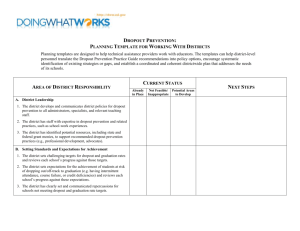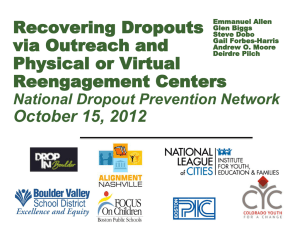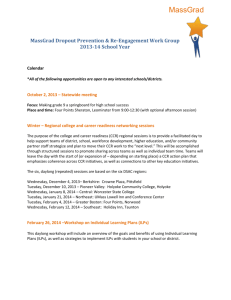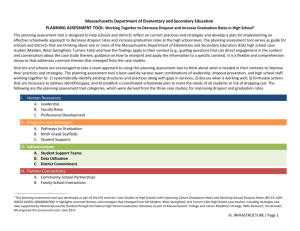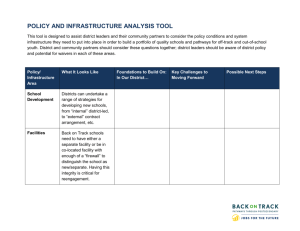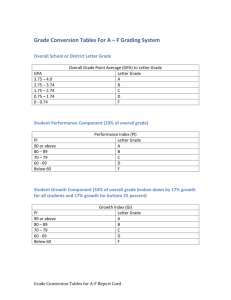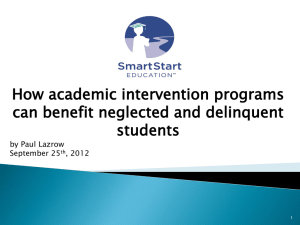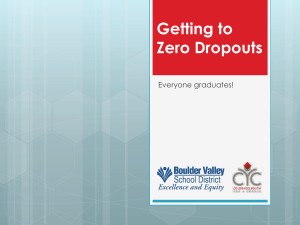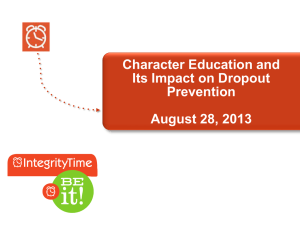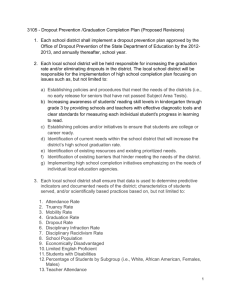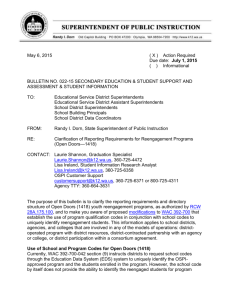MassGrad - Massachusetts Department of Education
advertisement
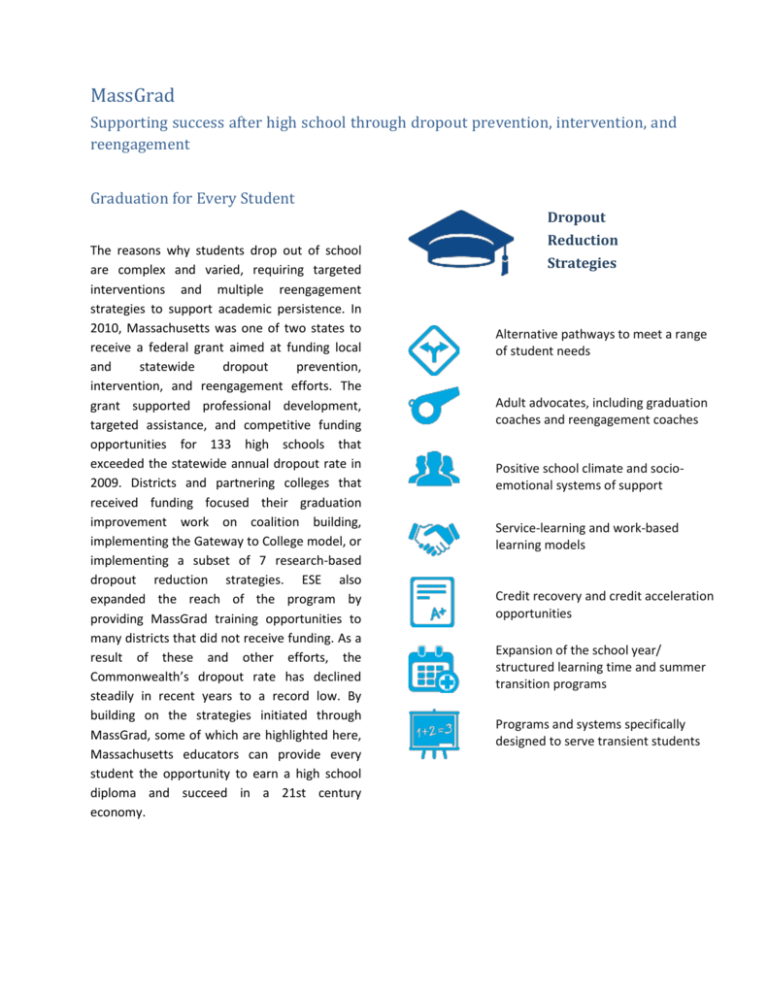
MassGrad Supporting success after high school through dropout prevention, intervention, and reengagement Graduation for Every Student Dropout The reasons why students drop out of school are complex and varied, requiring targeted interventions and multiple reengagement strategies to support academic persistence. In 2010, Massachusetts was one of two states to receive a federal grant aimed at funding local and statewide dropout prevention, intervention, and reengagement efforts. The grant supported professional development, targeted assistance, and competitive funding opportunities for 133 high schools that exceeded the statewide annual dropout rate in 2009. Districts and partnering colleges that received funding focused their graduation improvement work on coalition building, implementing the Gateway to College model, or implementing a subset of 7 research-based dropout reduction strategies. ESE also expanded the reach of the program by providing MassGrad training opportunities to many districts that did not receive funding. As a result of these and other efforts, the Commonwealth’s dropout rate has declined steadily in recent years to a record low. By building on the strategies initiated through MassGrad, some of which are highlighted here, Massachusetts educators can provide every student the opportunity to earn a high school diploma and succeed in a 21st century economy. Reduction Strategies Alternative pathways to meet a range of student needs Adult advocates, including graduation coaches and reengagement coaches Positive school climate and socioemotional systems of support Service-learning and work-based learning models Credit recovery and credit acceleration opportunities Expansion of the school year/ structured learning time and summer transition programs Programs and systems specifically designed to serve transient students Massachusetts annual dropout rates, 2005-2014 The Power of Partnerships School-community partnerships focused on a particular dropout reduction challenge can provide a robust set of resources and expertise to better support schools and students. Partnerships with behavioral health agencies help schools provide early intervention to students with behavioral health needs and establish a school climate that promotes academic, social, and emotional success. Service and work-based learning programs that are implemented in partnership with community organizations and employers allow students to identify connections between their classroom experience and workplace success, improving academic persistence and civic engagement. Gateway to College, a unique partnership between districts and community colleges, supports students at risk of dropping out by offering them the opportunity to finish their high school diploma on a college campus while also earning college credits. Flexible Pathways that Address a Broader Range of Student Needs Students are most likely to persist in an educational environment where they feel successful. Through smaller, more personalized alternative programs, students have the opportunity to build connections with educators, increasing the likelihood that they will graduate. While some alternative pathways target specific student groups, such as parenting teens or expelled students, many enroll students with a range of factors that place them at-risk of dropping out. Credit recovery and acceleration initiatives also provide a flexible pathway to make the goal of high school graduation attainable for students who are over the traditional high school age and behind on credits due to attendance issues or failing grades. By providing opportunities for online learning, Saturday school, or summer enrichment, districts can help struggling students recover credits and gain critical academic skills. Developing a Culture of Support to Foster Student Engagement By providing struggling students with a trained adult advocate, such as a graduation coach, educators can improve students’ connection to school. The graduation coach can help identify at-risk students through early indicator data and other sources, and provide assistance to keep them on track academically before they consider dropping out. Coaches also engage parents, guardians, and outside organizations to supplement the support students receive in school. Reengagement specialists operate as dropout outreach workers and are a critical component of a system of student support. These coaches act as a conduit back to school for those who have already dropped out by helping students, especially those who are over-age and under-credited, access resources that will allow them to succeed. Many of the factors that place students at risk of dropping out are not academic in nature, and therefore require non-academic systems of support. Students’ behavioral health is intricately connected to academic, social, and emotional success at school. Establishing professional learning communities and providing professional development on topics including restorative justice, cultural competency, positive behavior interventions and supports (PBIS), and mental health can support the development of a positive school culture that is responsive to students’ needs. School Profile: North High School, Worcester, MA In partnership with organizations such as African Community Education, Latino Education Institute, Plumley Village, and Y.O.U. Inc., administrators at North High School developed a coalition designed to provide English language learners (ELL) with academic and behavioral supports in order to close the proficiency gap and encourage academic persistence. The coalition’s collaborative case management model brings together community partners, families, and educators to address student needs, both inside and outside the classroom. The coalition led to the school’s decision to implement a restorative justice program, in which students are empowered to discuss and solve their own conflicts. The program has contributed to a drastic reduction in suspensions and strengthened the school community. Since the coalition’s formation in 2011, the four-year graduation rate for ELLs at North High School has grown from 50 percent to 73 percent. North High School ELL four-year graduation rate Get Involved: Dropout Prevention and Reengagement Work Group While the Commonwealth has made notable gains in reducing the number of students who drop out of high school, districts continually seek to improve their methods of engaging students. The Dropout Prevention and Reengagement Work Group provides an opportunity for teams of educators from districts across Massachusetts to share promising practices and receive technical assistance regarding dropout reduction. Contact collegeandcareerreadiness@doe.mass.edu to find out how your district can get involved.
